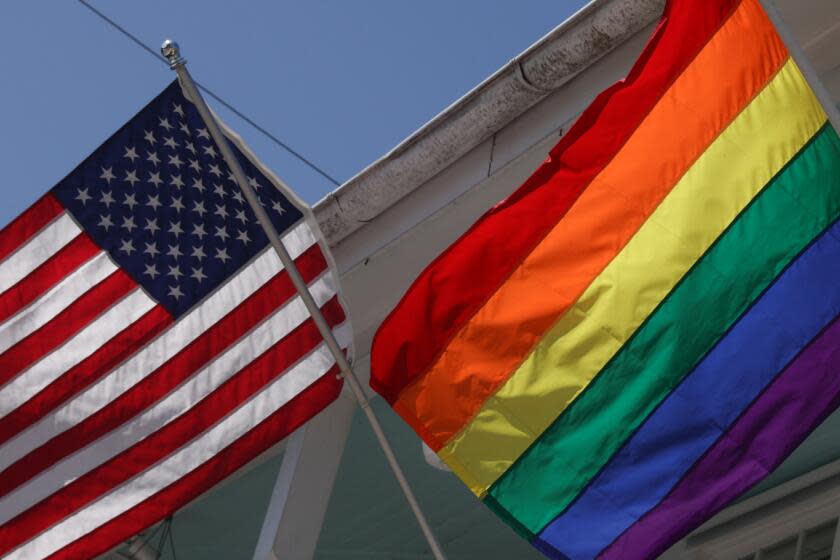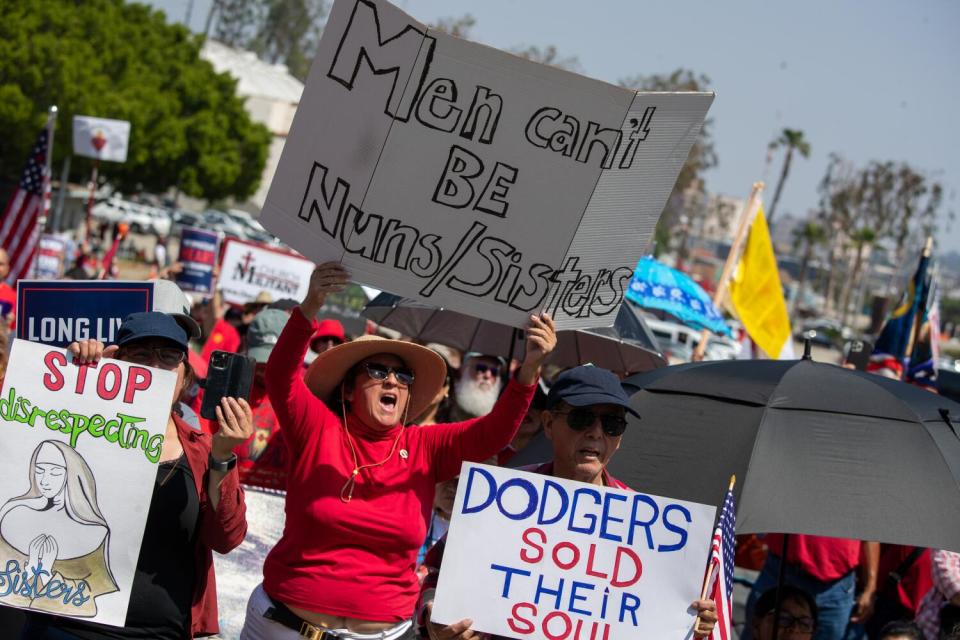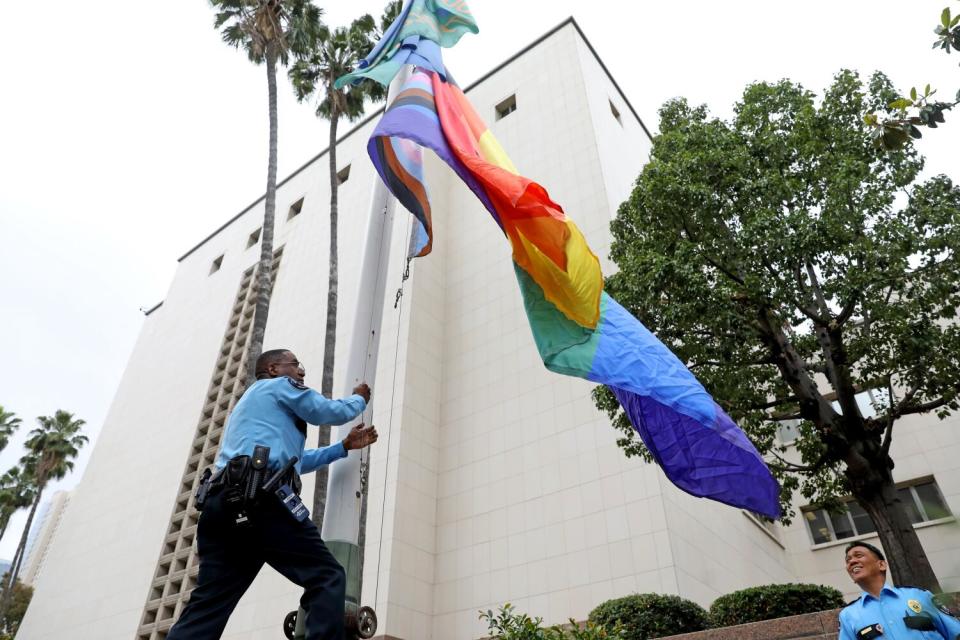Column: How a homophobe repented and became an imperfect LGBTQ+ ally

I remember him well: his toothy smile. His spiky shag haircut. His high cheekbones and ringing laugh.
I also remember what I called the teenager. Queer. Fairy. Even worse names.
We attended Anaheim High in the mid-1990s. I was a senior, he was a freshman. He was one of the few out students on a campus that was overwhelmingly Latino. He endured taunts, epithets and bullying, while cutting down his antagonists with withering insults more often than not.
It didn't stop me and others.
I learned my homophobia from macho cousins and a father so anti-gay that when my classmate came over to our house for my sister’s party, my dad forbade us to go in the pool, lest something infect us. Homosexuality, my thinking went, was not just an abomination. "They" were a threat to the people I loved — Americans, Mexicans, Catholics, good people — by merely existing.
When my best friend, Art, told me to check my prejudice, I’d spout off a litany of biblical verses — Leviticus this, Genesis that, a hell of a lot of Paul. Nothing could convince me that I should stop my nastiness, let alone accept gay and lesbian people as normal.
An HBO movie changed everything. In Mr. Elder’s biology class, we watched “And the Band Played On,” based on the bestselling book by Randy Shilts about the early days of AIDS. I turned away in disgust at any hint of same-sex affection. But the story — about how the Reagan administration and society at large let a terrible disease spread because it first emerged in the gay community — haunted me.
I might have thought homosexuality to be terrible — but an uncaring government that let people die because of who they were was far worse. A few months later, I went up to my classmate and apologized. I was sincere, but I’ll never forget the understandable skepticism on his face.
I’ve been trying to atone for my sins ever since.
I told my brother when he entered fourth grade to tell me when he and his friends played a schoolyard game called Smear the Queer. One person randomly got the label, and everyone else threw a football at him. I knew it wasn't a matter of if my brother would join in but when — because I was taught that game, too.
One day, he came home excitedly and reported that he and his friends finally played Smear the Queer. I explained what the word meant and what the game represented, and made him swear to never join again.
Professionally, I went on to slam politicians and groups that try to deny LGBTQ+ people their rights and dignity. Today, I have close LGBTQ+ friends and still get in heated debates with loved ones about their latent and overt homophobia.
I am an imperfect ally, though. I cannot erase the hurt I inflicted before, so I remember those dark days to remind myself that I can always do better.
That's why a recent poll done for The Times by NORC at the University of Chicago and paid for by the California Endowment brought me some hope about this country’s long, painful journey toward accepting LGBTQ+ people — and was also a gut check on how much work there still is to do.

The survey was a sequel of sorts to a pioneering 1985 Times project asking people how they felt about homosexuality. The differences between then and now are stark. Back then, 73% felt gay and lesbian relationships were wrong, which an accompanying Times story noted was almost unchanged from a similar 1973 Gallup poll. This most recent poll? Just 28% felt that way.
In 1985, 51% of respondents thought there should be workplace protections for gay and lesbian people. Today, the number is 77%. The older poll showed that 35% were “uncomfortable around gays.” This time around, the question wasn’t even asked.
The 1985 Times study was released with no photos or comment. This time around, we published our findings with moving essays by my current and former LGBTQ+ colleagues. The poll and essays were part of a project called "Our Queerest Century" that is live on our website and will appear in print as a special section June 23.
These surveys show that beliefs do change with time and exposure. But while there's more acceptance of gay and lesbian people today, a new intolerance has emerged. The 1985 poll didn't ask about transgender people. The Times/NORC poll did — and the results are discouraging.
More than a third said they would be very or somewhat upset if their child came out as gay or lesbian (in 1985, the figure was 89%). But if the child came out as trans or nonbinary, the percentage increased to 48%. When it came to letting people “[live] their lives as they wish,” only 19% “strongly or somewhat disapproved” if the person was gay or lesbian. Trans or nonbinary? 31%.
Even more telling was a question about whether increased attention on trans and nonbinary people in the media and politics was good or bad. Only 16% thought it was good, while 40% thought it was bad (42% answered “neither”).
Read more: The Times Poll : American Views of Gays: Disapproval, Sympathy
The poll unsurprisingly shows that politics and religion correlate with people's opinions on LGBTQ+ issues. But I also feel that a lack of familiarity plays a huge role. While 72% of American adults in the Times/NORC survey said they knew someone who identified as gay or lesbian, only 27% said the same about transgender or nonbinary people. When you have a come-to-Jesus moment with someone you've been taught to see as "different," you quickly realize how foolish you are.
Case in point: me, again.
A decade after my shameful behavior toward my Anaheim High classmate, I read a powerful column by Times sportswriter Mike Penner that revealed he would return from vacation as Christine Daniels.
“I am a transsexual sportswriter,” Penner wrote. “It has taken more than 40 years, a million tears and hundreds of hours of soul-wrenching therapy for me to work up the courage to type those words.”
I was so moved that I sent a note of appreciation through a mutual friend. To my surprise and delight, Daniels wanted to meet me to talk about dealing with sudden fame. I was then at the OC Weekly, and The Times had featured me and my column, “¡Ask a Mexican!”, leading to an avalanche of attention.
I was nervous, and not just about meeting a writer whose work I had long admired. I didn't know anyone who identified as transsexual and worried that I would offend Daniels by asking an inappropriate question or using the wrong name or pronoun.

At a panini spot in Old Towne Orange, Daniels quickly disabused me of my low-key transphobia. I found myself focusing on the person before me: Kind. Hilarious. Brilliant. Happy. In the Weekly, I continued to proudly bash the ghouls who ridiculed Daniels, all the way to the sad day in 2009 when Mike Penner, who had returned to using that byline in The Times, died by suicide.
Today, as city councils reject calls to fly rainbow flags during Pride Month and school boards ban books and curricula that touch on anything LGBTQ+, as adults protest drag time story hours in the name of protecting children and hurl invectives at drag nuns while mocking the rise of "Latinx," I remember my journey from hatred to humility.
I asked Bamby Salcedo, president and chief executive of the TransLatin@ Coalition, about the best way to change closed hearts and minds.
It's not "about doing a training or checking a DEI box" she said, referring to diversity, equity and inclusion; it's about having difficult conversations from a place of love, "because hate doesn't win."
A heartfelt push back to someone's anti-LGBTQ+ attitudes, Salcedo said, can "put out that seed of change. And if you plant it, la cosecha sale [the harvest comes]."
I remind myself that people can change — and those who've experienced a road to Damascus moment must urge others to follow our path.
The most avoidable sin is ignorance, after all, and all sinners must repent. Take it from one.
This story originally appeared in Los Angeles Times.


